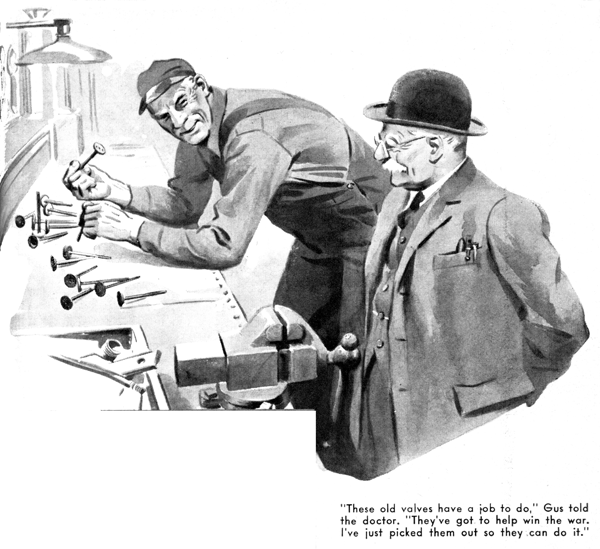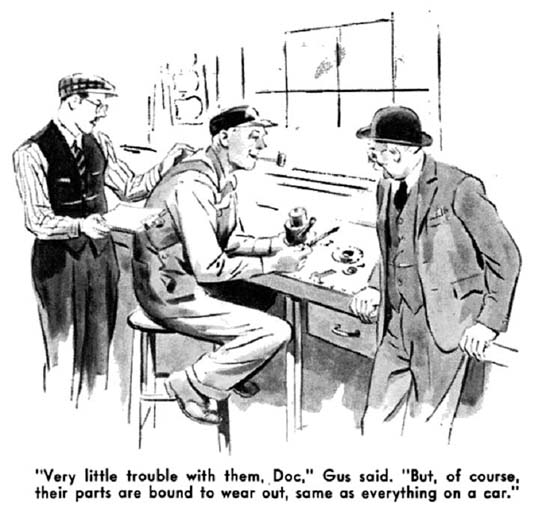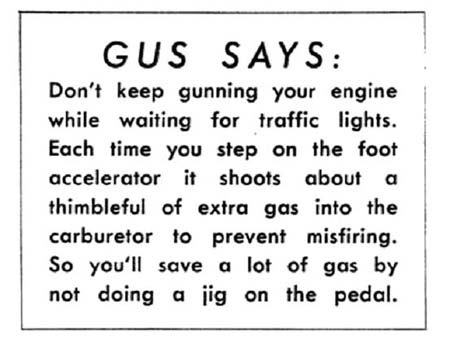August 1942
GUS FIGURES OUT A GILHICKIE
by Martin Bunn
But, Seriously, He Also Tells How Garage Men
Can Help Win the War by Sending Old Valves to Uncle Sam.
Just Where - and Why - You'll Find Out From
Him.

Stopping at the Model Garage late one afternoon for a chat with his friend Gus Wilson, Dr. Marvin found him pawing over an accumulation of old valves that he had spread out on his workbench. Gus grinned at his visitor, grunted a greeting, and went on examining the valves. The doctor started doing the same thing. But after he had picked up a few valves, looked at them, and put them down again, he turned to Gus.
"Why are you fooling with this junk, Gus?" he wanted to know. "There isn't a valve here that even you can do anything with. Some of them are burned, some are badly warped, some are hopelessly pitted, and not one of them is worth a darn."
"Sure I know it, Doc," Gus agreed placidly. "But these old valves have a job to do. They've got to help win the war."
"Huh?" the doctor asked.
"They've got to help win the war," Gus repeated.
"I've just picked them out of my scrap box so that they can do it. You remember Harry, don't you, Doc -- our old grease monkey? He was with us three or four years, and before he went into the Army he had developed into the best all around mechanic we've ever had in the shop -- that is, when he didn't have some girl on his mind so bad that he couldn't think of anything else. Well, Harry's a lieutenant in the Armored Force now. He's stationed at the Armored Force School down at Fort Knox, where they teach the boys how to keep tanks rolling. I had a letter from him this morning -- here it is."
Gus fished the letter out of his workbench drawer. "It's mostly about some girl down in Louisville he thinks he wants to marry," he explained with a grin, "but while he was writing it he had a lucid interval, and he said -- here it is: "We've got some swell valve-refacing units here at the School, but we can't get hold of enough old valves for the boys to work on, so they have to do their practicing on new valves, which is a waste of good valves and not nearly as good practice. Say, Gus, why don't you dig through that old junk box under your workbench and pick out all those no-good old valves you've been hoarding for years and send them down here where they'll do some good? Any size will do. Address them to the Commandant. Armored Force School, Fort Knox, Kentucky, and don't mention my name or the General will think I'm trying to run the School for him. You'll have to pay the parcel post on them, but that won't break you. Say, Gus, I've met a lot of swell girls since I've been in the Army, but this one is . . . "
Gus put the letter down. "He's off about that fool girl again," he said disgustedly.
"But that's a good idea of his about old valves. I'm going to pack up all I can find and send them down there. I've phoned a couple of shops, and they're going to send their old valves over to me," Gus told him.
"We ought to be able to get a boxful together. Everyone wants to help, and -- "
He broke off as a voice said loudly; "Hello, there, Gus -- my car ready?" and looking up saw Ez Zacharias, his R.F.D. cap on the back of his shaggy head, standing in the open shop door.
"All ready, Ez," Gus told him. "It's on the greasing rack. Wait a minute and I'll get it off for you."
"Never mind -- I'll get it," Ez said gruffly.
Gus saw him climb into his car and then didn't pay any more attention to him. But after half a minute he heard the big postman's voice raised in wrath. "What the heck have you done with this crate?" Ez yelled. "It won't start. When I step on her all I get is a sputter . . . Hey! Come on over here! Somethin's burnin; under the hood!" Hurry up!"
Gus was at the greasing rack in a flash, and Dr. Marvin wasn't more than a step behind him. They could smell something burning, and a faint wisp of blue smoke was spiraling ceilingward from the car's front end. Gus jerked up the hood and made a swift examination, but he couldn't locate the source of the smoke.
"Try her again," he directed. Ez stepped on the starter, but the engine wouldn't take off. "Pump on the accelerator a few times," Gus told him. Ez pumped. "Now step on the starter again," Gus said. "No good, hey? All right. I think I know what's the matter. Release your brakes, Ez. We'll push her down to the floor so I can get a good look at her."
Gus and Dr. Marvin shoved her back, then Gus took another look under the hood.
"Thought so," he said after a minute or so. "Your automatic choke has gone wrong somehow." He stuck his head under the hood and sniffed. "Yep -- that's where the smoke came from. Know anything about automatic chokes, Ez?"
"Who, me?" Ez said defensively. "No, nothin' except that if you got one on your car you don't have to pull out the choke to get started on a cold mornin', the way you used to."
"How about you, Doc?" Gus asked.
"I'm afraid that I don't know anything more about them than Ez does," Dr. Marvin admitted.
"Well, you're going to now," Gus told them. "Let's see, now -- "
He removed the automatic choke and started to disassemble it. "There are four or five different makes of automatic chokes in common use," he said, "and each one works a little differently from the others, although the idea of them all is the same -- to supply the engine with a rich mixture for starting, and then to automatically lean the mixture as the engine gets warmed up. On this particular model the choke is worked by an electromagnet that is connected with the battery when the starter is on. The device has a coil made of enamel-insulated wire and is enclosed in this metal shield. Let's see, now -- yes, here it is!"
Gus pointed to a small piece of fiber that extended from the shield. The fiber had broken, and a sizable piece of it was missing. "This is the cause of the trouble, of course -- this broken fiber," Gus told them. "The fiber insulates the enameled wires from the metal shield. When that piece of fiber broke off the wire came in contact with the metal, shorted and burned through. That's where the smoke came from."
"Yeah?" Ez said disinterestedly. "Well -- so what? What I want is to get home to my supper -- I'm hungrier than a bear. How long is it goin' to take you to fix this-here gilhickie so my car'll start? That's what I want to know."
"Ten minutes -- maybe only nine if you don't pester me too much while I'm doing it." Gus told him. He went over to his workbench, rummaged through one of its drawers, and came back with a short length of tubular insulation. Unwrapping a turn of wire from the magnet, he slipped the insulation over it, and then connected the wire to the lead from the starter. Then he replaced the choke on the carburetor. "Try her now," he said.
"How about the automatic choke on my car -- does it work the same way as the one on Ez's?" Dr. Marvin asked after the grinning postman had driven out of the shop.
Gus scratched his ear as he did a little thinking. "No," he said after a few seconds, "it doesn't. The one on your car has a thermostatic spring that holds a piston at the top of its travel as long as the engine is cold. That keeps the choke valve closed and supplies the engine with a rich mixture for starting. Slots in the choke piston allow the vacuum of the intake manifold to draw air from near the exhaust manifold into the intake manifold. As the air grows warm, it heats the thermostatic spring. That decreases the spring's tension and gradually opens the choke and leans the mixture. That's a sort of rough blueprint, Doc, but maybe it'll give you an idea of how your choke works."
Dr. Marvin nodded. "It does," he said. "Do you have much trouble with these automatic chokes, Gus?"
"Very little trouble with them, Doc," Gus said. "They're pretty foolproof. But, of course, their parts are bound to wear out sooner or later, same as almost everything else on a car.
"The trouble I've run into most often is the choke's air-cleaner screen being badly clogged up with dirt. When that happens the flow of warm air from the manifold is cut down and the choke doesn't open fully. A tip-off on this condition is a sort of loping idle with a warm engine. That's easy enough to fix. All you have to do is wash the screen with gasoline and then blow it out with compressed air. That should be done every 5,000 miles or so.
"Air leaks cause grief now and then, and sometimes the cause isn't easy to find. Sometimes you run into a leak in the choke suction tube gasket, which decreases the action of the manifold vacuum on the choke piston. The result of that is that the choke doesn't open all the way when the engine is running at low speeds, and gasoline is wasted. A new gasket is the only answer.
"Sometimes the gasket of the choke cover shrinks or breaks and allows cold air to get in. That slows down the operation of the choke. The only sensible thing to do is to put in a new gasket.
"Sticking choke valves can cause trouble. If a valve sticks open, the result is hard starting. If it sticks closed, or even partly closed, the result usually is hard starting and poor engine performance. Sticking valves usually are caused by a bent shaft or by sloppy valve installation, but sometimes the cause isn't anything more serious than dirt. If the parts are damaged, they should be replaced. Well, Doc, I'll have to be starting for the Park House, or they won't have any dinner left when I get there."
"I'll eat with you," Dr. Marvin said. "My wife is having a day down in the city. Do you know what I'd like to do if I had a couple of spare hours this evening, Gus? I'd like to take one of those automatic chokes apart and see just how it works. They're interesting -- what was it that Ez Zacharias called them?"
"Gilhickles," Gus told him, grinning. "A gilhickle is first cousin to a gadget. I like all the new gilhickles and gadgets modern cars have, Doc -- figuring them out keeps me interested in automobiles!"
END
L. Osbone 2019

